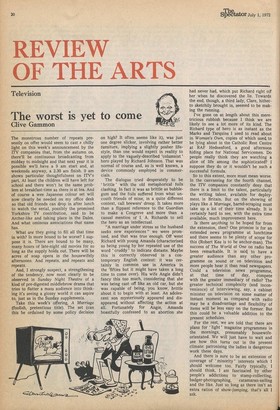Television
The worst is yet to come
Clive Gammon
The monstrous number of repeats presently on offer would seem to cast o chilly light on this week's announcement by the ITV companies that, from the autumn on, there'll be continuous broadcasting from midday to midnight and that next year it is possible we'll have a 9 am start and, at weekends anyway, a 2.30 am finish. 9 am shows particular thoughtfulness on ITV's part. At least the children will have left for school and there won't be the same problem at breakfast-time as there is at tea. And of course a wee Japanese colour set will now clearly be needed on my office desk so that old friends can drop in after lunch to watch the serial, possibly the promised Yorkshire TV contribution, said to be Archer-like and taking place in the Dales. And what ominous associations that name has.
What are they going to fill all that time in with? Is more bound to be worse? I suppose it is. There are bound to be many, many hours of late-night old movies for so long as the supply holds out. There will be acres of soap opera in the housewifely afternoons. And repeats, and repeats and repeats.
And, I strongly suspect, a strengthening of the tendency, now most clearly to be observed in Sunday Night Theatre of a kind of pre-digested middlebrow drama that tries to flatter a mass audience into thinking it's seeing a glossy world it can aspire to, just as in the Sunday supplements.
Take this week's offering, A Marriage (foolish, pretentious title). The set (can this be ordained by some policy decision on high? It often seems like it), was just one degree slicker, involving rather better furniture, implying a slightly posher lifestyle, than one would expect in reality to apply to the vaguely-described 'columnist' hero played by Richard Johnson. That was normal of course and, as is well known, a device commonly employed in commercials.
The dialogue tried desperately to be ' brittle ' with the old metaphorical foils clashing. In fact it was as brittle as bubblegum and the foils suffered from what uncouth friends of mine, in a quite different context, call brewers' droop. It takes more than a flippant reference to the Guardian to make a Congreve and more than a casual mention of I. A. Richards to sell the hero as an intellectual.
"A marriage under stress as the husband seeks new experiences" we were promised, and that was true enough. Off went Richard with young Amanda (characterised as being young by her repeated use of the word ' cruddy ' to indicate distaste. Maybe this is correctly observed in a contemporary English context: it was certainly in common use in America in the 'fifties but it might have taken a long time to come over). His wife Angie didn't fancy this too much, considering that she was being cast off like an old car, but she was capable of being, you know, brittle about it to begin with at least. An adolescent son mysteriously appeared and disappeared without affecting the action at all. Fortunately for Angie, Amanda boastfully confessed to an abortion she had never had, which put Richard right off her when he discovered the lie. Towards the end, though, a third lady, Clare, hitherto sketchily brought in, seemed to be making the running.
I've gone on at length about this meretricious rubbish because I think we are likely to see a lot more of its kind. The Richard type of hero is as instant as the Marks and Tarquins I used to read about in Woman's Own, copies of which used, to be lying about in the Catholic Rest Centre at RAF Hednesford, a good afternoon hiding place for National Servicemen. Do people really think they are watching a slice of life among the sophisticated? 1 suppose they do or it wouldn't be such a successful formula.
So to this extent, more must mean worse. In the canvassing for the fourth channel, the ITV companies constantly deny that there is a limit to the talent, particularly the writing talent, available for deployment, in Britain. But on the showing of plays like A Marriage, barrel-scraping must take up a lot of their time already. It is certainly hard to see, with the extra time available, much improvement here.
Is there anything to be hoped for from the extension, then? One promise is for an extended news programme at lunchtime and there seems to be plenty of scope for this (Robert Kee is to be anchor-man). The success of The World at One on radio has been remarkable. It is said to have a greater audience than any other programme on sound or on television and more people hear it than read newspapers. Could a television news programme, at that time of day, compete with the greater immediacy of radio? The greater technical complexity (and inconvenience) of interviewing, say, a cabinet minister on television on some matter of instant moment as compared with radio may be a disadvantage and flexibility of items will be less easy on the former. But this could be a valuable addition to the present schedules.
For the rest, we are told that there are plans for ' light ' magazine programmes in the mornings, presumably housewifeorientated. We will just have to wait and see how this turns out in the present climate: patronising the ladies is dangerous work these days.
And there is sure to be an extension of coverage of ' minority ' interests which I should welcome too. Fairly typically, I should think, I am fascinated by other people's addictions to stamp-collecting, badger-photographing, catamaran-sailing and the like. Just so, long as there isn't an extra ration of show-jumping, that's all I ask.






















































 Previous page
Previous page